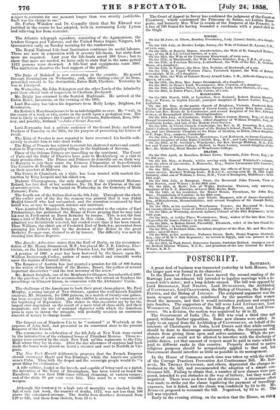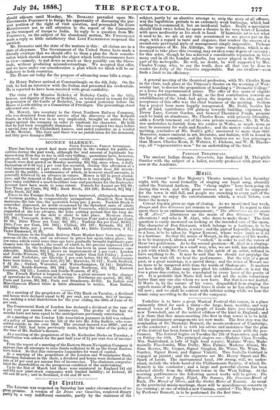POSTSCRIPT.
SATURDAY.
A great deal of business was transacted yesterday in both Houses, but the larger part was formal in its character.
In the House of Peers Lord GAGE moved the second reading of the Marriage Law Amendment bill intended to legalize marriage with a de- ceased wife's sister ; and a long debate ensued. The bill was opposed by Lord REDESDALE, Earl NELSON, Lord DUNGANNON, the Archbishop of CANTERBURY, Lord CRANWORTH, the Bishop of OXFORD, the Bishop of EXETER, and the Bishop of LINCOLN. The scriptural argument was the main weapon of opposition, reinforced by the assertion that women dread the measure, and that it would introduce jealousy and suspicion into families. The supporters of the bill were Lord LYNDHURST' Lord WODEHOUSE, Earl GRANVILLE, the Bishop of Rreox, and LordOTER- STONE. On a division, the motion was negatived by id to 22. The Government of India (No. 3) Bill was read a third time and passed, without further opposition. Some new clauses were added. In reply to an appeal from the Archbishop of CANTERBURY, on behalf of the interests of Christianity in India, Lord DERBY said that while nothing should be done to discourage missionary efforts, the Government will abstain from giving them open and active assistance. While the pre- judices of caste could not be allowed to interfere with the discharge of public duties, yet that amount of respect must be paid to caste which is paid to different ranks in this country. Property devoted to native religious purposes should be scrupulously applied to that end, but Government should interfere as little as possible in its management.
In the House of Commons much time was taken up with the detail of the Corrupt Practices Prevention Act Continuance Bill. Mr. ROE- BUCK, Mr. THOMAS DUNCOMBE, and others, deprecated the changes in- troduced in the bill, and recommended the adoption of a simple con- tinuance bill. Failing to obtain that, a number of new clauses were pro- posed, intended to put obstacles in the way of bribery, but they were all negatived. There were no fewer than six divisions. A strenuous effort was made to strike out the clause legalizing the payment of travelling- expenses, but it failed, and the clause was confirmed by 94 to 66. Mr. ROEBUCK proposed to recommit the bill. Negatived, by 92 to 46. The bill was reported.
Early in the evening sitting, on the motion that the House, on rising
should adjourn until Monday, Mr. DISRAELI prevailed upon Mr. Camanse= FORTESCIIE to forego his opportunity of discussing the pre- sent position of the right of visit question, and persuaded Sir JOHN ELYRINSTONE not to call attention to the report of the Committee on the transport of troops to India. In reply to a question from Mr. FORTESCUE, on the subject of his abandoned motion, Mr. FITZGERALD made a reply so little satisfactory that Lord PALMERSTON reopened the question. Mr. DISRAELI said the state of the matters is this : all claims are in a state of abeyance. The Government of the United States have made a friendly overture that we should offer to them a plan for their conside- ration which should accomplish the object which both Governments have in view—namely, to put down as much as they possibly can the Slave- trade, without producing misunderstandings. We accepted that offer, and we have under our consideration a plan which we think will be sa- tisfactory to both countries.
The House sat today for the purpose of advancing some bills a stage.
Sir Henry Bulwer arrived at Constantinople on the 6th July. On the 14th he had an interview with the Sultan and presented his credentials. He is reported to have been received with great cordiality.
The claim of Sir Maurice Berkeley of Berkeley Castle, to the title, honour, and dignity of Baron of Berkeley, as being seized as tenant for life in possession of the Castle of Berkeley, was opened yesterday before the House of Lords sitting as a Committee of Privileges. The proceedings stand adjourned sine die.
Mr. Mowatt, late secretary to the Great Northern Railway Company, who was dismissed from their service after the discovery of the Redpath frauds, in which he was in no way implicated, brought an action for da- mages against the company in order to vindicate his character. He held that he had been wrongfully dismissed. The case occupied two days before a special Jury at the Chelmsford Assizes, and ended yesterday in a verdict for Mr. Mowatt. The Jury said there was no justification for his dismissal, and they gave damages 2001.



























 Previous page
Previous page